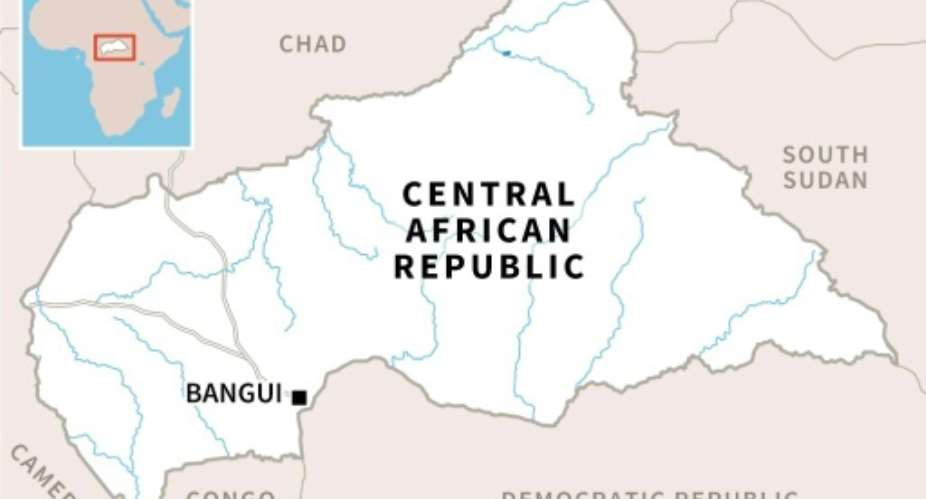The Central African Republic's government said Thursday that its army along with Russian and Rwandan allies had recaptured a western border town from rebels, reopening a key supply route that had been blocked since December.
A rebel alliance waging an offensive against the government had cut-off the capital, including from much-awaited aid languishing on the Cameroonian border, but pro-government forces have recently captured a string of towns along the route that leads to the capital Bangui.
"After the towns of Boali, Bossembele, Bossemptele, Yaloke and Bouar, the Central African Armed Forces (FACA) and their Russian and Rwandan allies liberated the town of Beloko, thereby opening the national road to Cameroon," the government said on Facebook.
"We will therefore ensure the movement of people and goods in both directions on the Bangui-Beloko axis in complete safety," Prime Minister Firmin Ngrebada said on Facebook.
Six of the country's most powerful armed groups -- which controlled around two-thirds of the country -- joined forces in mid-December to launch an offensive against the government of President Faustin Archange Touadera.
The offensive planned to disrupt December's elections, but they went ahead and Touadera was re-elected.
The rebels announced plans to "march on Bangui" and reached its outskirts on January 13, but were pushed back and have sought to cut off the capital, according to the United Nations.
The rebels then seized several towns and carried out attacks along the more than 700 kilometres (435 miles) of national roads.
Aid trucks wait at border
But the rebels faced a stronger adversary than expected.
Alongside 12,000 peacekeepers from the UN's MINUSCA force in the country since 2014, Rwandan soldiers and Russian paramilitaries were deployed in late December to shore up Touadera's government and the struggling army.
Since late January, the pro-government forces have engaged in a counter-offensive aiming to free the route to the border and allow aid deliveries.
Bangui has not suffered any significant shortages, but prices have soared for imported goods such as flour and onions.
The UN's Office for the Coordination of Humanitarian Affairs (OCHA) has said that 1,600 trucks, 500 of them with humanitarian aid, are blocked at the Cameroonian border.
Almost all goods imported by the landlocked country, rated the world's second poorest by the UN's Human Development Index, arrive by road from Cameroon.
OCHA says some 57 percent of the country's population of around 4.9 million will require assistance and protection this year.
On Monday, the first aid convoy was able to reach Bangui under escort by UN peacekeepers after the 50-day blockade.
The rebels, on the defensive after losing several towns, said Wednesday they would temporarily allow aid convoys passage to Bangui.
"Contacts and negotiations have taken place with humanitarian providers to exceptionally open a humanitarian corridor for NGOs," the Coalition of Patriots for Change rebel alliance said in a statement.
Though the route has been recovered by the army and its allies, the aid convoys have not yet set off and the threat of rebel ambushes remains.





 SSNIT must be managed without gov’t interference – Austin Gamey
SSNIT must be managed without gov’t interference – Austin Gamey
 Ejisu by-election could go either way between NPP and independent candidate — Gl...
Ejisu by-election could go either way between NPP and independent candidate — Gl...
 We never asked ministers, DCEs to bring NPP apparatchiks for returning officer r...
We never asked ministers, DCEs to bring NPP apparatchiks for returning officer r...
 No one denigrated the commission when you appointed NDC sympathizers during your...
No one denigrated the commission when you appointed NDC sympathizers during your...
 Used cloth dealers protests over delayed Kumasi Central Market project
Used cloth dealers protests over delayed Kumasi Central Market project
 A/R: Kwadaso onion market traders refuse to relocate to new site
A/R: Kwadaso onion market traders refuse to relocate to new site
 Dumsor: Corn mill operators at Kaneshie market face financial crisis
Dumsor: Corn mill operators at Kaneshie market face financial crisis
 Jamestown fishermen seek support over destruction of canoes by Tuesday's heavy d...
Jamestown fishermen seek support over destruction of canoes by Tuesday's heavy d...
 Election 2024: EC to commence voter registration exercise on May 7
Election 2024: EC to commence voter registration exercise on May 7
 Public schools rebranding: We’re switching to blue and white, we’re painting all...
Public schools rebranding: We’re switching to blue and white, we’re painting all...
